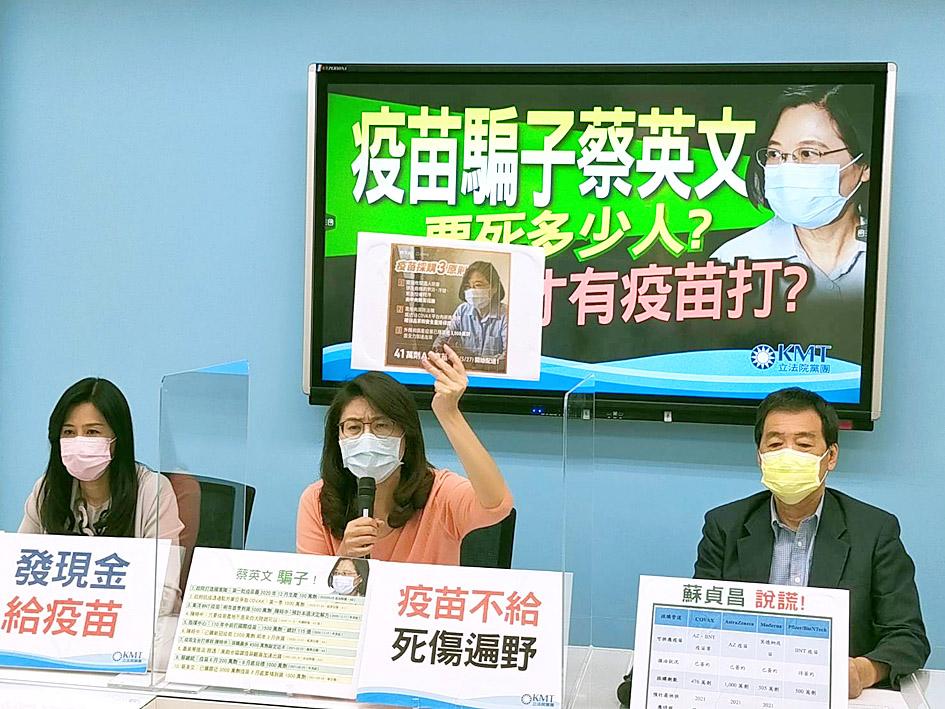Chinese Nationalist Party (KMT) members are “following the same playbook” and “singing the same tune” as the Chinese government as the party pushes for Taiwan to procure Chinese-made COVID-19 vaccines, the Democratic Progressive Party (DPP) said yesterday.
“In the past few days, KMT politicians and auxiliary groups have used terms and descriptions found in leaked instructions to refer to vaccines from China as German-made Pfizer products and downplay the fact that they were produced in China,” DPP spokeswoman Hsieh Pei-fen (謝佩芬) said in a news release.
It is clear that the KMT is instructing its cyberarmy and supporters to conceal the real issues, and instructing them how to counter the advice and information of the Central Epidemic Command Center (CECC), Hsieh said.

Photo: Lin Liang-sheng, Taipei Times
“At this crucial time, KMT politicians are focused on misleading people, creating instability and dissent in society, and turning people against the CECC,” she said, calling on KMT Chairman Johnny Chiang (江啟臣) to make a public apology on the matter.
Minister Without Portfolio Lo Ping-cheng (羅秉成), the Executive Yuan’s spokesman, said that KMT politicians deserve criticism for demanding that COVID-19 vaccines be procured from China.
“China has not been transparent about its domestic situation amid the COVID-19 pandemic or about its vaccines,” Lo told a news conference. “If Taiwan were to obtain vaccines from China, there would be safety and efficacy concerns, and even risk factors.”
“KMT politicians are clamoring for Chinese-made vaccines, but such a move would benefit Beijing’s ‘united front’ propaganda, which is focused on fomenting political dissent and division in Taiwan,” he said.
“Instead of trying to source vaccines from China, it would be better for China to stop its obstruction of Taiwan’s efforts to secure COVID-19 vaccines from the international community,” Lo said.
Vaccines that enter Taiwan must go through strict inspection and evaluation processes to ensure safety and efficacy, he said.
Even emergency use authorization requires compliance with the commercial legal framework, while handling and inspections would require a lot of human resources and funds, meaning that the CECC and other central government authorities would be involved, he said.
Separately yesterday, President Tsai Ing-wen (蔡英文) praised the teams distributing a new batch of AstraZeneca vaccines across the nation, with frontline healthcare workers, police officers and firefighters prioritized to receive jabs.
Tsai thanked officials who helped check the quality of the vaccines.
“We will conduct strict checks to ensure their quality,” she said.

MAKING WAVES: China’s maritime militia could become a nontraditional threat in war, clogging up shipping lanes to prevent US or Japanese intervention, a report said About 1,900 Chinese ships flying flags of convenience and fishing vessels that participated in China’s military exercises around Taiwan last month and in January have been listed for monitoring, Coast Guard Administration (CGA) Deputy Director-General Hsieh Ching-chin (謝慶欽) said yesterday. Following amendments to the Commercial Port Act (商港法) and the Law of Ships (船舶法) last month, the CGA can designate possible berthing areas or deny ports of call for vessels suspected of loitering around areas where undersea cables can be accessed, Oceans Affairs Council Minister Kuan Bi-ling (管碧玲) said. The list of suspected ships, originally 300, had risen to about 1,900 as

Japan’s strategic alliance with the US would collapse if Tokyo were to turn away from a conflict in Taiwan, Japanese Prime Minister Sanae Takaichi said yesterday, but distanced herself from previous comments that suggested a possible military response in such an event. Takaichi expressed her latest views on a nationally broadcast TV program late on Monday, where an opposition party leader criticized her for igniting tensions with China with the earlier remarks. Ties between Japan and China have sunk to the worst level in years after Takaichi said in November that a hypothetical Chinese attack on Taiwan could bring about a Japanese

MORE RESPONSIBILITY: Draftees would be expected to fight alongside professional soldiers, likely requiring the transformation of some training brigades into combat units The armed forces are to start incorporating new conscripts into combined arms brigades this year to enhance combat readiness, the Executive Yuan’s latest policy report said. The new policy would affect Taiwanese men entering the military for their compulsory service, which was extended to one year under reforms by then-president Tsai Ing-wen (蔡英文) in 2022. The conscripts would be trained to operate machine guns, uncrewed aerial vehicles, anti-tank guided missile launchers and Stinger air defense systems, the report said, adding that the basic training would be lengthened to eight weeks. After basic training, conscripts would be sorted into infantry battalions that would take

DEEP-STRIKE CAPABILITY: The scenario simulated a PLA drill that turned into an assault on Taiwan’s critical infrastructure, with the launchers providing fire support Taiwan yesterday conducted this year’s first military exercises at Longsiang Base in Taichung, demonstrating the newly acquired High Mobility Artillery Rocket System’s (HIMARS) ability to provide fire support and deep-strike capabilities. The scenario simulated an attack on Penghu County, with HIMARS trucks immediately rolling into designated launch areas and firing barrages at the Wangan (望安) and Cimei (七美) islands, simulating the provision of fire support against invading forces. The HIMARS are supposed to “fire and leave,” which would significantly increase personnel and equipment survivability, a military official said. The drill simulated an exercise launched by the Chinese People’s Liberation Army (PLA) Eastern